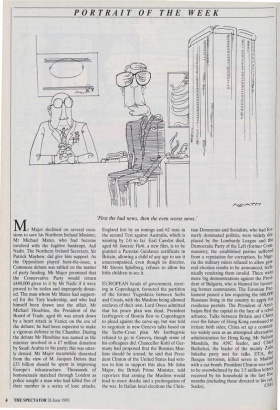PORTRAIT OF THE WEEK
news.' `First the bad news, then the even worse Mr Major declined on several occa- sions to save his Northern Ireland Minister, Mr Michael Mates, who had become involved with the fugitive bankrupt, Asil Nadir. The Northern Ireland Secretary, Sir Patrick Mayhew, did give him support. As the Opposition played hunt-the-issue, a Commons debate was tabled on the matter of party funding. Mr Major promised that the Conservative Party would return £440,000 given to it by Mr Nadir if it were proved to be stolen and improperly donat- ed. The man whom Mr Mates had support- ed for the Tory leadership, and who had himself been drawn into the affair, Mr Michael Heseltine, the President of the Board of Trade, aged 60, was struck down by a heart attack in Venice on the eve of the debate; he had been expected to make a vigorous defence in the Chamber. During the debate Mr Heseltine was named as the minister involved in a £7 million donation by Saudi Arabia to his party; this was utter- ly denied. Mr Major meanwhile dissented from the view of M. Jacques Delors that £33 billion should be spent in improving Europe's infrastructure. Thousands of homosexuals marched through London as police sought a man who had killed five of their number in a series of lone attacks.
England lost by an innings and 62 runs in the second Test against Australia, which is winning by 2-0 so far. Earl Cawdor died, aged 60. Jurassic Park, a new film, is to be granted a Parental Guidance certificate in Britain, allowing a child of any age to see it unaccompanied, even though its director, Mr Steven Spielberg, refuses to allow his little children to see it.
EUROPEAN heads of government, meet- ing in Copenhagen, favoured the partition of the former Yugoslavia between Serbs and Croats, with the Muslims being allowed enclaves of their own. Lord Owen admitted that his peace plan was dead. President Izetbegovic of Bosnia flew to Copenhagen to plead against the carve-up, but was told to negotiate in new Geneva talks based on the Serbo-Croat plan. Mr Izetbegovic refused to go to Geneva, though some of his colleagues did. Chancellor Kohl of Ger- many had proposed that the Bosnian Mus- lims should be armed; he said that Presi- dent Clinton of the United States had writ- ten to him to support this idea. Mr John Major, the British Prime Minister, told reporters that arming the Muslims would lead to more deaths and a prolongation of the war. In Italian local elections the Chris-
tian Democrats and Socialists, who had for- merly dominated politics, were widely dis- placed by the Lombardy League and the Democratic Party of the Left (former Com- munists); the established parties suffered from a reputation for corruption. In Nige- ria the military rulers refused to allow gen- eral election results to be announced, tech- nically rendering them invalid. There were more big demonstrations against the Presi- dent of Bulgaria, who is blamed for favour- ing former communists. The Estonian Par- liament passed a law requiring the 600,000 Russians living in the country to apply for residence permits. The President of Azer- baijan fled the capital in the face of a rebel advance. Talks between Britain and China over the future of Hong Kong continued to irritate both sides; China set up a commit- tee widely seen as an attempted alternative administration for Hong Kong. Mr Nelson Mandela, the ANC leader, and Chief Buthelezi, the leader of the mainly Zulu Inkatha party met for talks. ETA, ti!e, Basque terrorists, killed seven in Madriu with a car-bomb. President Clinton was said to be overwhelmed by the 3.5 million letters received by his household in the last five months (including those directed to his cat,
Socks). CSI4


























































 Previous page
Previous page